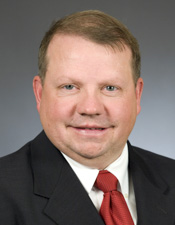Early learning scholarships could see boost in funding
Lawmakers focused on early education are poised to increase funding for an early learning program that would help low-income families place their children in preschool. But by how much?
That discussion continues to take shape among members of the House Education Finance Committee who heard two bills Tuesday that would renew expanded access to the Department of Education’s early learning scholarship program for low-income families of 3, 4 and 5 year olds.
The program — popular among legislators on both sides of the aisle since its creation in 2011 — has an annual budget of nearly $28 million. But some early education advocates have pushed to increase funding to as much as $150 million per year over the next biennium, which they say would allow 20,000 more eligible preschool-age children to receive scholarships.
Rep. Ron Kresha (R-Little Falls) sponsors two bills that would renew appropriations for the program for the 2016-17 biennium and allow the education commissioner to increase the scholarship amount for children enrolled in a three- or four-star Parent Aware-rated child care program.
The scholarships are currently capped at $5,000 per child and allow families at or below 185 percent of the federal poverty level to place their 3 and 4 year olds in a variety of child care programs that are certified as high-quality Parent Aware providers.
The committee laid over HF603 and HF1220 for possible omnibus bill inclusion. Sen. Dick Cohen (DFL-St. Paul) sponsors SF606, the companion to HF603, which awaits action by the Senate Finance Committee. HF1220 has no Senate companion.
Scholarships tied to rating system
The Parent Aware rating system rolled out in 2012. It was developed by a joint effort among the Department of Human Services, Department of Education and local child care advocacy organizations. The rating system gives official designation to participating providers who engage their children in “kindergarten readiness” learning curriculums. Participating licensed day care programs are allowed to work with the program to achieve a rating scale between one and four “stars.”
Providers can only receive early scholarships if they are Parent Aware-certified. But HF1220 would also allow the education commissioner to determine if a program is eligible to accept early learning scholarships based on an evidence-based program evaluation or program review up through 2020, which would allow licensed day care providers who choose not to participate in Parent Aware the potential to receive scholarship eligible families.
Currently, about 1,900 licensed child care providers out of 11,000 in the state are a certified Parent Aware-program.
Two ways to access scholarships
As part of the early learning scholarship program, the Department of Education developed two pathways for families to use to access what it considers “high quality” pre-kindergarten programs.
Pathway 1 scholarships follow the child and are awarded directly to families who meet eligibility requirements and are paid to the early childhood program that the family chooses. The program must participate in the Parent Aware Quality Rating and Improvement System and may include Head Start, school district prekindergarten and preschool programs, and child care programs.
Pathway II scholarships are awarded to families through an eligible four-star Parent Aware-rated program. These include Head Start, school district prekindergarten and preschool programs, and child care programs within geographic regions identified by the Department of Education.
Kresha said he would like to see all funding for the program be allocated to Pathway 1 scholarships, which he believes targets families and children who are most in need.
“The intention of the early scholarships is to reach our disadvantaged youth and to put that money in the hands of those families with portability and flexibility,” Kresha said.
Early learning advocates who represent Head Start and Early Childhood and Family Education programs testified in support of preserving Pathway 2 scholarships, which they said allow school districts flexibility to enhance early education programs based on the needs of eligible families.
Eliminating Pathway 2 scholarships, which allow for school-based programs to serve as an intermediary to eligible families, would compromise quality of the program, said Rep. Paul Marquart (DFL-Dilworth).
Related Articles
Search Session Daily
Advanced Search OptionsPriority Dailies
Ways and Means Committee OKs proposed $512 million supplemental budget on party-line vote
By Mike Cook Meeting more needs or fiscal irresponsibility is one way to sum up the differences among the two parties on a supplemental spending package a year after a $72 billion state budg...
Meeting more needs or fiscal irresponsibility is one way to sum up the differences among the two parties on a supplemental spending package a year after a $72 billion state budg...
Minnesota’s projected budget surplus balloons to $3.7 billion, but fiscal pressure still looms
By Rob Hubbard Just as Minnesota has experienced a warmer winter than usual, so has the state’s budget outlook warmed over the past few months.
On Thursday, Minnesota Management and Budget...
Just as Minnesota has experienced a warmer winter than usual, so has the state’s budget outlook warmed over the past few months.
On Thursday, Minnesota Management and Budget...
